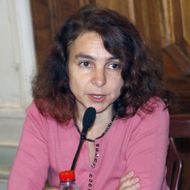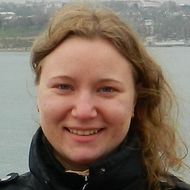Search Query: How to Study Migration with Google Trends

Experts have calculated that the number of international students in Russia has grown six times over the last decade, and researchers say that many of those who are studying today would like to stay in the country. This, alongside issues such as why Google Trends are worth looking into, were covered at the HSE XXIV Yasin International Academic Conference on Economic and Social Development section on demography and labour markets.
The section included the sessions ‘Demographic Development of Russian Regions in Conditions of Turbulence’, ‘Problems of Internal Migration in Russia’, ‘Trends of International Migration in Russia’, ‘Questions of the Study of Fertility’ and ‘The Factor of Seasonality in Demographic Processes’.
At the session on international migration in Russia, Elena Vakulenko, Professor at the HSE Faculty of Economic Sciences (FES), and FES postgraduate student Georgy Bronitsky presented the paper ‘Predicting International Migration Using Google Trends’.
Georgy Bronitsky explained that international migration researchers often face delays in data acquisition, and the methods of calculation change from time to time, which makes year-to-year comparisons harder. It is also difficult to analyse statistics from different countries and international organisations, while the study of queries in search engines makes it possible to obtain more precise data faster.
For example, the study of queries on emigration to Germany helped the scholars advance their research. They used linguistic methods of machine learning to evaluate arrays of search queries describing intentions to migrate. In particular, they determined search terms such as ‘embassy of Germany’, ‘German visa’, and ‘jobs in Germany’. Then, the authors standardised the data from Google Trends, Yandex Wordstat, and OECD for further comparison, taking into account the lag time of a month to a year between the queries and the departure.
Julia Florinskaya, Leading Research Fellow at RANEPA, presented her paper ‘Student Migration to and from Russia: Should We Expect Changes After 2022?’ The paper was based on public statistics data and supplemented with interviews with Russians students studying abroad and international students at Russian universities.

Julia Florinskaya
Julia Florinskaya said that from 1995–2021, the number of international students in Russia grew six times and reached 364,000 people. The plan is to increase this number to 700,000. Over 50% of foreign students in Russia come from CIS countries. Citizens of China, India, and countries in the Middle East and Africa also comprise a considerable share. She said that since 2007, student migration in Russia has followed the model of developed countries. The number of international students in Russia was much higher than the number of Russian students abroad; the latter was also growing, but the share of Russians among international students did not exceed 1% and was less than, for example, the share of students from Kazakhstan.
According to Julia Florinskaya, the main reason for foreign graduates of Russian universities to go back home were difficulties related to getting a residence permit after graduation. Some of them also mentioned negative attitudes from police and xenophobia in their everyday communications. At the same time, many students from CIS countries are trying to stay in Russia and get a job that is relevant to their degree.
The situation with Russian students abroad in 2022 was not critical, explained Julia Florinskaya. There were no massive dropouts from European and American universities, the difficulties with tuition payments were resolved in April, and the media made individual situations look like a systemic crisis.
The international migration session also featured a paper by Valery Yumaguzin, Senior Lecturer at the HSE Vishnevsky Institute of Demography on ‘Russian Emigration in 2022 According to Mobile Operators’. Boburmirzo Ibrokhimov and Rashid Javed from Westminster International University in Tashkent together with Mazhar Mughal from Pau Business School, France, talked on ‘Migrants Remittances and Fertility in the Post-Soviet States’. The session was chaired by Olga Chudinovskikh, Head of the MSU Laboratory of Population Economics and Demography.
Sergey Zakharov, Chief Research Fellow at the HSE Vishnevsky Institute of Demography, Elena Churilova, Research Fellow at the HSE International Laboratory for Population and Health, and Olga Rodina, master’s student at the HSE Vishnevsky Institute of Demography, presented their paper ‘Get Married and Have a Child: A Variety of Ways to Realize Births’ at the session ‘Questions of the Study of Fertility’. According to the paper authors, a considerable share of children were born as a result of extramarital conceptions during the last decades of the Soviet Union and the first post-Soviet years; by the early 2000s, this share exceeded 50%, and by 2012, it decreased to 44%.
In the late Soviet Union, birth out of wedlock was an indicator of disadvantaged demographics. In the 2010s, due to changing matrimonial and reproductive behaviour (increasing age of marriage and first childbirth, decreasing number of unplanned pregnancies and abortions), the situation changed: more children have been born to parents who are partners but are not married officially.
According to Elena Churilova, the source of data for the study was an anonymised database of births in 2012–2021. The authors calculated the time from marriage to childbirth and determined whether the conception was marital or extramarital.

Elena Churilova
The share of children who were born out of wedlock or after a premarital conception decreased to 37.6% in 2020 and grew by 1% in 2021, which the researchers believe is a result of complicated marriage registration procedures due to the pandemic. The share of extramarital conceptions decreased particularly considerably among women aged 19–34. At the same time, the authors registered a growing trend for premarital conceptions and births out of wedlock among teens under 18, which is an indicator of expanding casual sexual relations and a low level of awareness about contraception methods.
The session also included the following papers: ‘Financial Well-being and Reproductive Intentions in a Situation of Increasing Uncertainty in 2020’ by Ekaterina Mitrofanova, Senior Lecturer at the HSE Vishnevsky Institute of Demography together with Veronika Kraynova and Olga Rodina, master’s students of Demography at HSE University; ‘Regional Maternity Capital Programmes: Impact on Fertility in Russia’ by Elena Vakulenko, Natalia Ivashina, Associate Professor at FEFU, and Yana Svistyilnik, bachelor’s students of Economics at FEFU (a double-degree programme with HSE); as well as ‘Experience in Implementing Regional Monitoring of Demographic Development’ by Alexandra Shabunova, Director of VolRS RAS, and Olga Kalachikova, Deputy Director of VolRS RAS.
The session was chaired by Ekaterina Mitrofanova, Senior Lecturer at the HSE Vishnevsky Institute of Demography.
See also:
Applications for Participation in XXVI April International Academic Conference Still Open
Applications can be submitted on the conference website until December 16, 2025. The programme has been developed around five research themes: Economics, Human Capital and Society, Instrumental Methods and Models, Foresight Research, and International Research. The heads of these areas have presented, in video format, the priority topics and sections for which they are expecting submissions.
Applications to Participate in April International Academic Conference Now Open
HSE University is now accepting proposals to present academic reports at the XXVI April International Academic Conference named after Evgeny Yasin. Applications can be submitted until December 16, 2025. The conference events will take place mainly on-site in Moscow from April 14 to 17, 2026.
Mortgage and Demography: HSE Scientists Reveal How Mortgage Debt Shapes Family Priorities
Having a mortgage increases the likelihood that a Russian family will plan to have a child within the next three years by 39 percentage points. This is the conclusion of a study by Prof. Elena Vakulenko and doctoral student Rufina Evgrafova from the HSE Faculty of Economic Sciences. The authors emphasise that this effect is most pronounced among women, people under 36, and those without children. The study findings have been published in Voprosy Ekonomiki.
24 Countries Represented at 25th Yasin International Academic Conference Held by HSE University
The Programme Committee of the 25th Yasin (April) International Academic Conference on Economic and Social Development has summed up the initial results. In 2025, 1,384 people from 24 countries and 29 Russian regions participated in the conference, with 335 of them delivering presentations.
Stuck in the Net: How Much Time Children Spend Online
On average, a schoolchild spends 48 hours a week on studies—equivalent to a six-day working week for an adult. This was highlighted by experts at the round table ‘Domains of Children’s Well-Being Evaluation for Human Potential and Evidence-Based Social Policy Development,’ held as part of the 25th Yasin (April) International Academic Conference.
Russian and Chinese Scholars Share Experience of Transformation of Doctoral Education
The Russian and Chinese postgraduate education systems originally borrowed their institutional frameworks from the Soviet Union. However, in the 21st century, they have evolved along different paths. While key performance indicators for postgraduate programmes in Russia are declining, China is seeing a rapid increase in the number of postgraduate students. These contrasting trajectories and the reforms undertaken in each country in recent decades were the focus of a roundtable discussion held as part of the 25th Yasin (April) International Academic Conference.
Nobel Laureate Proposes Solution to Markov Equilibrium Problem
In dynamic games, a Markov equilibrium involves strategies that guide players' behaviour based on the current state of the game, rather than its entire history. This approach is effective when players have access to complete information. But when uncertainty arises in the game—for instance, when players are unsure of who they are dealing with—this approach can become problematic. Eric Maskin, Nobel Laureate in Economics and Professor at Harvard University, addressed this issue in a paper presented at the XXV Yasin (April) International Academic Conference on Economic and Social Development held at HSE University from April 15 to 18, 2025.
‘The World Is Becoming More Complex and Less Predictable’: What Scientists Say about the Future
The future is now more difficult for researchers to forecast, and events that are hard to predict are playing an increasingly significant role. But there is good news too: scientists are confident that humanity will adapt to any changes. This was the focus of discussion at the International Symposium ‘Foresight in a Rapidly Changing World,’ which took place as part of the 25th Yasin (April) International Academic Conference.
Fragmentation and Bloc Formation: How the Global Economy is Changing
Sergey Dubinin, former head of the Bank of Russia and Professor of Finance and Credit at the Faculty of Economics at Moscow State University, has delivered an honorary address at the XXV Yasin (April) International Academic Conference. He spoke about the transformation of the global monetary and financial system, as well as the Russian economy.
More Children, More Happiness: HSE Experts Study Impact of Number of Children on Russians' Assessment of Happiness
Russians with children feel happier than those without children. At the same time, the number of children influences the assessment of happiness: the more children Russians have, the happier they feel. These conclusions were outlined inthe report ‘More Children, More Happiness: The Impact of the Number of Children on Russians’ Assessment of Happiness,’ presented at the XXV Yasin (April) International Academic Conference on Economic and Social Development, held on April 15–18 at HSE University. The study was conducted by Elena Churilova, Senior Research Fellow, and Dmitry Jdanov, Chief Research Fellowat HSE International Laboratory for Population and Health.







